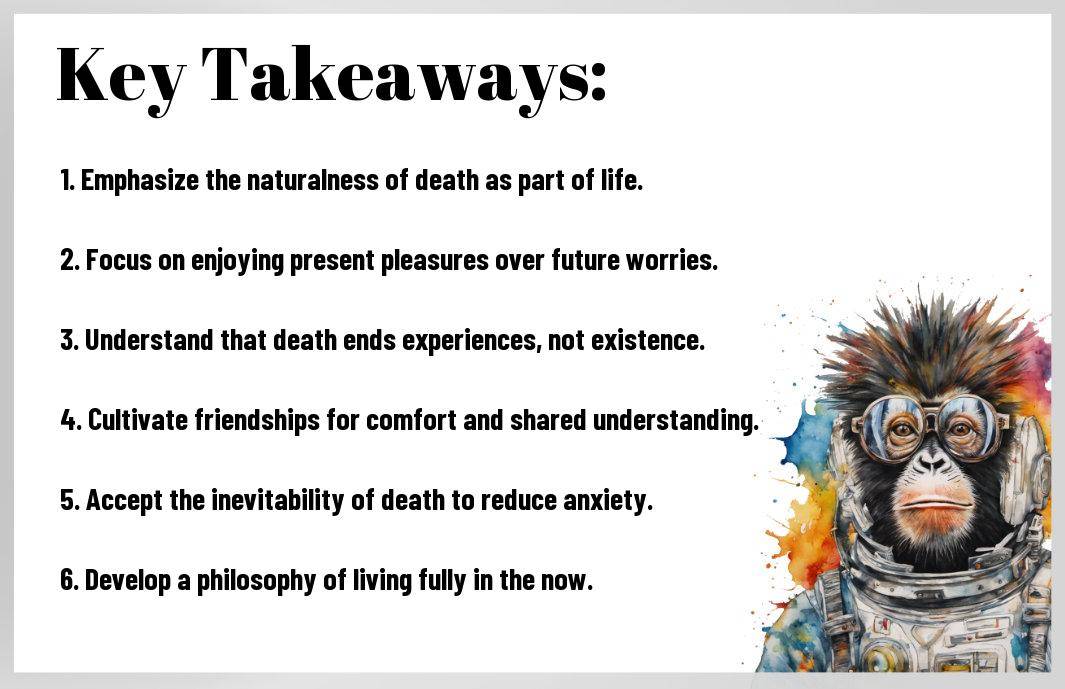
Newsletter Subscribe
Enter your email address below and subscribe to our newsletter

Enter your email address below and subscribe to our newsletter

It’s natural to feel anxious about death, but I’ve found that the ancient philosopher Epicurus offers some comforting insights that can help us navigate these feelings. By exploring his teachings, we can learn to embrace life and find peace in the face of mortality. Join me on this journey as I research into Epicurus’s wisdom and discover how we can ease our fears together.

A philosopher often hailed for his insights on happiness, Epicurus invites us to explore what truly brings joy and fulfillment to our lives. I find it fascinating that he argued our pursuit of pleasure is the highest good, yet he distinguished between different types of pleasures—those that are simple and necessary, versus those that may lead to complications and pain. Understanding this distinction helps me realize that true happiness often lies in the small, everyday moments rather than constant indulgence. It makes me reflect on how I can center my life around experiences that genuinely enhance my well-being.
Against the common notion that pleasure is always positive and pain is inherently negative, Epicurus taught me that both experiences are vital for a good life. For him, pleasure is not just about physical gratification; it encompasses mental tranquility and freedom from anxiety. I often find myself caught up in the rat race of modern living, overlooking the simple joys that can lead to lasting contentment. By focusing on cultivating pleasurable experiences that align with my values, I can reduce the pain and discomfort that arise from unfulfilled desires or negative thoughts.
Across the span of human experience, death stands as a universal truth that evokes both fear and fascination. Epicurus shared a unique perspective, suggesting that death is simply the absence of sensation, and therefore should not be feared. In his view, when we are alive, death is not present, and when death comes, we no longer exist to experience it. I appreciate this viewpoint, as it can help me shift my outlook on mortality—I realize that worrying about death detracts from the joy of living. Instead of fearing the end, I can choose to embrace life more fully.
And so, when I think about death, I try to remind myself that it’s a natural part of existence. Rather than viewing it as a frightening endpoint, I consider it simply as a transition, and this helps me cultivate a sense of peace. With Epicurus as my guide, I can focus on creating meaningful experiences in the here and now, rather than being overwhelmed by the shadows of what lies ahead. In this way, the philosophy of Epicurus allows me to live more fully, allowing enjoyment and tranquility to take center stage in my life.
One of the most beautiful aspects of Epicurean philosophy is its deep appreciation for the power of friendship. Epicurus believed that our connections with others are fundamental to achieving a life of happiness and tranquility. Personally, I find that nurturing supportive relationships allows me to feel more confident and secure in my life. By cultivating genuine friendships, I can create a safety net that helps me navigate life’s inevitable challenges, including the fear of death. The strong bonds we build with one another serve as a reminder that we are not alone in our experiences, enriching our lives together.
One necessary element of Epicurean thought is the idea that friendships are not just beneficial; they are necessary for a fulfilling life. I’ve discovered that surrounding myself with positive, understanding, and empathetic individuals makes my journey through life so much more enjoyable. By sharing my thoughts, fears, and insecurities with trusted friends, I feel lighter and more at ease. Their perspectives can help me navigate difficult moments, and the emotional support we provide each other cultivates resilience and peace. This supportive network reminds me that I can face life’s uncertainties with others by my side.
For me, one of the most rewarding aspects of friendship lies in the joy of shared experiences. When I engage in activities with friends—whether it’s a simple coffee catch-up or a grand adventure—I feel a sense of belonging that adds richness to my existence. According to Epicurean thought, these moments of laughter, connection, and collaboration are vital to cultivating happiness. It’s fascinating how just being together can create lasting memories and deepen our bonds, allowing us to savor life more fully. It reminds me that joy can often be found in the company of others, helping to alleviate any lingering fear I have about what lies ahead.
At the heart of shared experiences is the understanding that life is truly better when it is shared with others. When I reflect on my favorite moments, they often involve friends, laughter, and simple pleasures. This is where I find a sense of comfort and belonging, as those experiences create a tapestry of connections that define a meaningful life. Embracing Epicurean thought encourages me to forge connections with others, seek out shared experiences, and actively participate in the beauty of our relationships. In doing so, I find that my worries about the future become less daunting, replaced with hope and joy for what we can create together.

Not everyone realizes how vital it is to live in the here and now. When we dwell on uncertainty or fear, we often miss the beauty and richness that the present moment offers. Epicurus teaches us that by embracing the present, we can alleviate some of that anxiety about the future, including death itself. If I focus on what is happening around me and engage with my senses, I find joy in the little things, from the warmth of the sun to the laughter of friends. This perspective encourages us to savor life, making each moment count instead of worrying what is to come.
Present in the moment is where true happiness lies. Practicing mindfulness helps quiet my mind and allows me to fully appreciate life as it unfolds. When I let go of my worries about the past or what lies ahead, I’m better able to engage with my experiences without judgment or fear. Mindfulness isn’t just about meditating; it’s about bringing awareness into every aspect of my daily life, from eating to walking, to simply breathing. This practice can lessen my fear of death by grounding me in the fact that life is happening right now, and that is something worth celebrating.
After embracing mindfulness, I feel more equipped to live life in its fullest form. Engaging wholeheartedly with my passions, relationships, and experiences brings a sense of fulfillment that overshadows fleeting thoughts about mortality. When I prioritize joy and connection, I find that my fears begin to diminish. By making a conscious effort to seize opportunities and create beautiful memories, I can paint my life with vibrant colors, reminding myself that the present is a gift worth cherishing.
This shift in perspective has been transformative for me. I often find myself venturing into new experiences—taking that painting class I’ve always wanted to try, traveling to places that inspire me, or simply spending quality time with loved ones. These moments become reminders that each day is a chance to create and enjoy. As I fill my life with meaningful actions and connections, the thought of death becomes less daunting; instead, I focus on how I can make the most of every moment I have.
Despite the feelings of dread and anxiety that often accompany thoughts of death, I have discovered that much of our fear is largely rooted in misconceptions and societal conditioning. The way we perceive death can distort our reality, leading us to believe that it is something to be feared. By unpacking these illusions, I have found that we can alleviate the tightly woven grasp of fear and approach the idea of death with a more open and accepting mindset.
About death, there are countless myths that fuel our fears. Many people believe it to be an experience laden with pain and suffering, while others think that it signifies the complete end of existence. However, these ideas don’t truly reflect what death represents. I’ve come to see death as a natural transition, one that is part of life’s cycle rather than an abrupt conclusion. By navigating through these misconceptions, I have learned that embracing death can offer a sense of liberation rather than despair.
Across different cultures and philosophies, the perception of death varies widely. By revisiting my beliefs and understanding of death, I find that it is possible to shift my perspective and view it not as a daunting enemy, but as a natural phase of life. Epicurus’ approach reminds me that death is simply the absence of sensation, and thus it should not be a source of fear. Instead, I can focus on living a fulfilling life, using the finite nature of existence as motivation to embrace each day fully.
In addition, exploring and discussing thoughts on death with others can create a supportive environment where I can confront my fears without judgment. Engaging in conversations surrounding the inevitability of death allows me to confront my own feelings, share insights, and gain perspective from different experiences. This shift in approach not only eases my anxiety about death but also encourages me to foster deeper connections with those around me, enriching my current life while recognizing that death is merely a part of the larger journey we all share.

Once again, the teachings of Epicurus can feel both timeless and practical for navigating the complexities of life and the fear of death. As I examine into applying these principles, I find it valuable to embrace simple habits that align with Epicurean philosophies. Here are some practical tips I believe can help ease our worries:
After incorporating these strategies into my daily routine, I’ve noticed a more profound sense of peace and acceptance toward life’s impermanence.
Simple daily practices can significantly shift how I relate to the concepts of death and mortality. Starting my morning with meditation or quiet reflection sets the tone for a more mindful day. I take time to appreciate small moments, whether it’s savoring a bite of my favorite food or listening to music that lifts my spirit. These mindful practices not only ground me but also remind me of the joy that life offers.
In the evenings, I like to engage in rituals that celebrate the day, such as journaling about what I’m grateful for or recalling moments that brought me joy. This reflection helps to reinforce a positive perspective on life, encouraging me to embrace each day as a unique gift. By incorporating these practices into my routine, I feel more connected to reality and less fearful of what lies ahead.
After applying Epicurean principles, cultivating a positive mindset becomes a pivotal part of my journey. It’s imperative to acknowledge that life involves uncertainty, but it’s how I respond to that uncertainty that defines my experience. I find solace in reminding myself that death is a natural part of existence, allowing me to focus on the present and appreciate the beauty around me.
Practices like affirmations, deep breathing exercises, or even engaging with art can harness positivity in my life. I try to surround myself with uplifting content, be it books, podcasts, or people who inspire me. By intentionally creating an environment and mindset conducive to positivity, I actively choose to rise above fear and embrace a more fulfilling existence. After all, living mindfully and joyfully is the best way to honor life itself.
Keep in mind that transformation often comes from personal experience. When I look around, I see many individuals who have encountered the fear of death head-on and emerged with newfound perspectives. Their stories serve as profound illustrations of how the teachings of Epicurus can help us navigate the anxiety surrounding our mortality. From cancer survivors who find meaning in everyday moments to those who have faced near-death experiences, their paths offer valuable insights into transforming fear into acceptance and tranquility.
For instance, I recently came across the story of a woman who, after being diagnosed with a terminal illness, chose to embrace the principles of Epicurus. Instead of focusing on the impending end, she began to celebrate her life by indulging in simple pleasures—sharing meals with loved ones and savoring her favorite books. Her attitude shifted from dread to appreciation as she realized that each moment was an opportunity to truly live. Similarly, a friend of mine who faced a serious accident reflected on his life and realized that spending time with his family brought him joy far beyond any material possession. These transformative experiences remind me that embracing our mortality can lead to meaningful change.
At times, we may feel overwhelmed by the thought of death, but these stories teach us remarkable lessons about the value of the here and now. When we focus less on the fear of death and more on enjoying life’s little treasures, we can shift our mindset. I’ve found that joy can often be found in the most mundane situations, and these moments are what truly make life worthwhile. This notion has become central to my own journey and encourages me to seek beauty in everyday experiences.
Consequently, the insights gained from these transformations can guide you in reshaping your own outlook on life and death. When you embody this perspective, you may find that your anxieties diminish, allowing you to fully embrace the present. This shift can open doors to deeper connections, richer experiences, and a fuller appreciation for the life that surrounds you every day. By incorporating these lessons into your life, you might discover a more profound peace with the inevitability of death, ultimately transforming fear into a celebration of existence itself.
With this in mind, I realize that embracing the teachings of Epicurus can transform my perspective on death from one of anxiety to one of peace. By understanding that death is simply the end of sensation and not something to be feared, I find myself more at ease. It becomes clear that the focus should be on living a fulfilling life, filled with meaningful experiences, rather than worrying about what comes after. By cultivating friendships, practicing moderation, and seeking simple pleasures, I can lead a life rich in joy and devoid of dread about death.
Moreover, if you share similar fears, I encourage you to explore Epicurus’ philosophy further. You might find solace in articles such as Nothing to Fear. The Epicurean approach to death. Understanding that death is a natural part of existence allows us to focus our energy on what really matters – our relationships, passions, and the fleeting beauty of life. Ultimately, I believe that internalizing these lessons will bring not just peace regarding death, but also a renewed appreciation for the life we live.
A: Epicurus believed that death is simply the absence of sensation, and thus, it should not be feared. He argued that when we are alive, death is not present, and when death arrives, we no longer exist to experience it. This perspective can help alleviate the fear of death, as it emphasizes that there is no suffering in non-existence.
A: In his “letter to Menoeceus,” Epicurus outlines his thoughts on pleasure, pain, and death. He argues that understanding the nature of mortality can help individuals live a more fulfilling life. By recognizing that death is a natural part of existence and not something to dread, individuals can focus on cultivating joy and happiness in the present.
A: Epicurus emphasized that the pursuit of simple pleasures, such as friendship and intellectual growth, can create a meaningful and enjoyable life. By focusing on these aspects and cultivating a sense of fulfillment, individuals can diminish their anxiety about death, as they come to appreciate life more fully.
A: Friendship is a key element in Epicurus’ philosophy. He believed that close relationships provide comfort and support, especially in the face of existential fears like death. By fostering strong bonds with others, individuals can share their concerns and find solace in the understanding that they are not alone in their feelings.
A: Epicurus advocated for a rational approach to understanding death. He encouraged individuals to educate themselves about the natural world and death itself. Knowing that death is a common experience that everyone faces can foster acceptance, reducing fear and anxiety surrounding it.
A: One practical exercise is to engage in reflective thinking on mortality. Individuals can write about their feelings surrounding death, explore their values, and contemplate what a life well-lived looks like. Another exercise is to practice gratitude, focusing on the joys and experiences in life, which can shift attention away from fear and toward appreciation.
A: Yes, Epicurus’ teachings align with many modern mindfulness principles. Practicing mindfulness can help individuals stay present, reducing worry about the future and fears about death. Mindfulness encourages acceptance of all aspects of life, including death, fostering peace and understanding in the face of life’s impermanence.